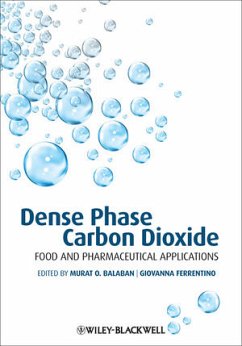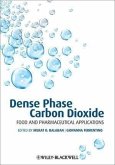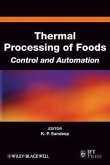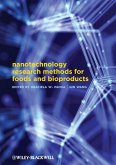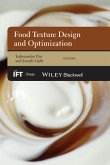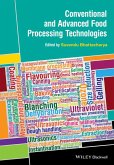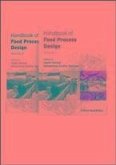Dense Phase Carbon Dioxide (eBook, PDF)
Food and Pharmaceutical Applications
Redaktion: Balaban, Murat O.; Ferrentino, Giovanna


Alle Infos zum eBook verschenken

Dense Phase Carbon Dioxide (eBook, PDF)
Food and Pharmaceutical Applications
Redaktion: Balaban, Murat O.; Ferrentino, Giovanna
- Format: PDF
- Merkliste
- Auf die Merkliste
- Bewerten Bewerten
- Teilen
- Produkt teilen
- Produkterinnerung
- Produkterinnerung

Hier können Sie sich einloggen

Bitte loggen Sie sich zunächst in Ihr Kundenkonto ein oder registrieren Sie sich bei bücher.de, um das eBook-Abo tolino select nutzen zu können.
Dense phase carbon dioxide (DPCD) is a non-thermal method for food and pharmaceutical processing that can ensure safe products with minimal nutrient loss and better preserved quality attributes. Its application is quite different than, for example, supercritical extraction with CO 2 where the typical solubility of materials in CO 2 is in the order of 1% and therefore requires large volumes of CO 2. In contrast, processing with DPCD requires much less CO 2 (between 5 to 8% CO 2 by weight) and the pressures used are at least one order of magnitude less than those typically used in ultra high…mehr
- Geräte: PC
- mit Kopierschutz
- eBook Hilfe
- Größe: 8.62MB
![Dense Phase Carbon Dioxide (eBook, ePUB) Dense Phase Carbon Dioxide (eBook, ePUB)]() Dense Phase Carbon Dioxide (eBook, ePUB)193,99 €
Dense Phase Carbon Dioxide (eBook, ePUB)193,99 €![Thermal Processing of Foods (eBook, PDF) Thermal Processing of Foods (eBook, PDF)]() Thermal Processing of Foods (eBook, PDF)193,99 €
Thermal Processing of Foods (eBook, PDF)193,99 €![Kosher Food Production (eBook, PDF) Kosher Food Production (eBook, PDF)]() Zushe Yosef BlechKosher Food Production (eBook, PDF)215,99 €
Zushe Yosef BlechKosher Food Production (eBook, PDF)215,99 €![Nanotechnology Research Methods for Food and Bioproducts (eBook, PDF) Nanotechnology Research Methods for Food and Bioproducts (eBook, PDF)]() Graciela Wild PaduaNanotechnology Research Methods for Food and Bioproducts (eBook, PDF)193,99 €
Graciela Wild PaduaNanotechnology Research Methods for Food and Bioproducts (eBook, PDF)193,99 €![Food Texture Design and Optimization (eBook, PDF) Food Texture Design and Optimization (eBook, PDF)]() Food Texture Design and Optimization (eBook, PDF)181,99 €
Food Texture Design and Optimization (eBook, PDF)181,99 €![Conventional and Advanced Food Processing Technologies (eBook, PDF) Conventional and Advanced Food Processing Technologies (eBook, PDF)]() Conventional and Advanced Food Processing Technologies (eBook, PDF)180,99 €
Conventional and Advanced Food Processing Technologies (eBook, PDF)180,99 €![Handbook of Food Process Design (eBook, PDF) Handbook of Food Process Design (eBook, PDF)]() Handbook of Food Process Design (eBook, PDF)459,99 €
Handbook of Food Process Design (eBook, PDF)459,99 €-
-
-
Dieser Download kann aus rechtlichen Gründen nur mit Rechnungsadresse in A, B, BG, CY, CZ, D, DK, EW, E, FIN, F, GR, HR, H, IRL, I, LT, L, LR, M, NL, PL, P, R, S, SLO, SK ausgeliefert werden.
Hinweis: Dieser Artikel kann nur an eine deutsche Lieferadresse ausgeliefert werden.
- Produktdetails
- Verlag: Wiley-Scrivener
- Seitenzahl: 336
- Erscheinungstermin: 30. März 2012
- Englisch
- ISBN-13: 9781118243343
- Artikelnr.: 38232479
- Verlag: Wiley-Scrivener
- Seitenzahl: 336
- Erscheinungstermin: 30. März 2012
- Englisch
- ISBN-13: 9781118243343
- Artikelnr.: 38232479
- Herstellerkennzeichnung Die Herstellerinformationen sind derzeit nicht verfügbar.
Contributors xiii
1 Introduction to Dense Phase Carbon Dioxide Technology 1
Giovanna Ferrentino and Murat O. Balaban
2 Thermodynamics of Solutions of CO2 with Effects of Pressure and
Temperature 5
Sara Spilimbergo and Ireneo Kikic
2.1 Introduction 5
2.2 Thermodynamics of liquid-vapour phase equilibria 6
2.2.1 Calculation of g 10
2.2.2 Calculation of f 13
2.2.3 Calculation of the liquid-vapour phase equilibria 20
2.3 Application to CO2-H2O system model 24
2.3.1 Non-electrolyte models 24
2.3.2 Electrolyte models 26
2.4 Thermodynamics of solid-vapour equilibria 28
2.5 List of symbols 31
3 Experimental Measurement of Carbon Dioxide Solubility 37
Giovanna Ferrentino, Thelma Calix, Massimo Poletto, Giovanna Ferrari, and
Murat O. Balaban
3.1 Introduction 37
3.2 Solubility of carbon dioxide in water 38
3.2.1 Definition and brief review of early studies 38
3.2.2 Physical properties associated with the phase diagram of carbon
dioxide 41
3.2.3 Effect of pressure and temperature on carbon dioxide solubility in
water 42
3.3 Experimental methods for carbon dioxide solubility measurement 45
3.3.1 Analytical methods 46
3.3.2 Synthetic methods 55
3.4 Review of experimental results 58
3.5 Conclusions 66
4 Effects of Dense Phase Carbon Dioxide on Vegetative Cells 67
Osman Erkmen
4.1 Introduction 67
4.2 Gases used for inactivating microorganisms 68
4.3 Effect of DPCD on vegetative microorganisms 69
4.3.1 Effect of DPCD on bacterial cells 69
4.3.2 Effect of DPCD on vegetative forms of fungi, pests and viruses 73
4.4 Factors affecting the sensitivity of microorganisms to DPCD 74
4.4.1 Effect of CO2 physical states 75
4.4.2 Effect of temperature and pressure 75
4.4.3 Effect of CO2 concentration 76
4.4.4 Effect of agitation 77
4.4.5 Effect of water content 77
4.4.6 Effect of pressurization and depressurization rates 78
4.4.7 Effect of pressure cycling 79
4.4.8 Effect of microbial type 79
4.4.9 Effect of initial microbial number 80
4.4.10 Effect of physical and chemical properties of suspension 80
4.4.11 Effect of culture conditions and growth phases 81
4.4.12 Injured microorganisms 82
4.4.13 Effect of combination processes 83
4.4.14 Effect of type of system 83
4.4.15 Treatment time and inactivation kinetics 84
4.5 Mechanisms of microbial inactivation by DPCD 85
4.5.1 Solubilization of CO2 under pressure into suspension 87
4.5.2 Cell membrane modification 88
4.5.3 Cytoplasmic leakage 88
4.5.4 Intracellular pH decrease 89
4.5.5 Key enzyme inactivation 90
4.5.6 Inhibitory effect of molecular CO2 and HCO3 - on metabolism 90
4.5.7 Intracellular precipitation and electrolyte imbalance 91
4.5.8 Extraction of vital cellular constituents 91
4.5.9 Physical cell rupture 92
4.6 Characterization of CO2 states and survival curves 93
4.7 Quantifying inactivation 96
4.8 Conclusions 96
5 Effects of Dense Phase Carbon Dioxide on Bacterial and Fungal Spores 99
Patricia Ballestra
5.1 Introduction 99
5.2 Inactivation of bacterial spores by DPCD 101
5.2.1 Effect of temperature 101
5.2.2 Effect of pressure 104
5.2.3 Effect of pH and aw of the treatment medium 105
5.2.4 Susceptibility of different bacterial spores 105
5.2.5 Effects of combination treatments 106
5.2.6 Mechanisms of bacterial spore inactivation 107
5.3 Inactivation of fungal spores by DPCD 109
5.4 Conclusion 112
6 Effects of DPCD on Enzymes 113
Murat O. Balaban
6.1 Introduction 113
6.2 Effects of gas bubbling 118
6.3 Alteration of the protein structure 118
6.4 Studies with multiple enzymes 119
6.5 Effects on specific enzymes 120
6.5.1 Alpha-amylase 120
6.5.2 Acid protease 121
6.5.3 Alkaline protease 121
6.5.4 Gluco-amylase 122
6.5.5 Lipase 122
6.5.6 Pectinesterase (PE) 124
6.5.7 Pectin methyl esterase (PME) 125
6.5.8 Polyphenol oxidase (PPO) 126
6.5.9 Tyrosinase 129
6.5.10 Lipoxygenase 130
6.5.11 Peroxidase 131
6.5.12 Alkaline phosphatase 133
6.5.13 Myrosinase 133
6.5.14 Hydrolases 134
6.6 Conclusions and suggestions 134
7 The Kinetics of Microbial Inactivation by Carbon Dioxide under High
Pressure 135
Maria G. Corradini and Micha Peleg
7.1 Introduction 135
7.2 The survival curve 137
7.2.1 Primary models 137
7.2.2 Secondary models - the effect of pressure alone 141
7.2.3 The temperature effect and that of other auxiliary factors 143
7.2.4 Dynamic treatments 144
7.3 Application of the models to published experimental data 147
7.3.1 Primary model derivation 147
7.4 Concluding remarks 151
7.5 List of symbols 154
8 Applications of DPCD to Juices and Other Beverages 157
Murat O. Balaban and Xiaojun Liao
8.1 Introduction 157
8.2 Juices processed with DPCD 158
8.2.1 Orange juice 158
8.2.2 Apple juice 162
8.2.3 Mandarin juice 164
8.2.4 Grapefruit juice 164
8.2.5 Watermelon juice 165
8.2.6 Coconut water 166
8.2.7 Guava puree 167
8.2.8 Grape juice 167
8.2.9 Pear 170
8.2.10 Carrot 170
8.2.11 Carrot juice 171
8.2.12 Peach 171
8.2.13 Kiwi 172
8.2.14 Melon 172
8.3 Other beverages processed with DPCD 173
8.3.1 Beer 173
8.3.2 Kava kava 173
8.3.3 Jamaica beverage 174
8.4 Conclusions 175
9 Use of Dense Phase Carbon Dioxide in Dairy Processing 177
Giovanna Ferrentino and Giovanna Ferrari
9.1 Introduction 177
9.2 Carbon dioxide in milk 178
9.3 Enzymes and microorganisms in milk 178
9.4 Application of carbon dioxide to milk 180
9.4.1 Carbon dioxide addition to raw milk 180
9.4.2 Carbon dioxide addition during thermal pasteurization of milk 183
9.4.3 Effect of carbon dioxide addition on sensory properties of milk 184
9.4.4 Dense phase carbon dioxide process 185
9.5 Application of carbon dioxide for enzyme inactivation 186
9.6 Application of carbon dioxide to cottage cheese production 188
9.7 Application of carbon dioxide to yogurt and fermented products 189
9.8 Application of carbon dioxide to casein production 190
9.8.1 Casein properties 190
9.8.2 Casein production by high-pressure carbon dioxide 191
9.8.3 Comparison between continuous and batch systems for casein production
by carbon dioxide 194
9.8.4 Economic comparison between high-pressure carbon dioxide and a
conventional process for casein production 196
9.9 Conclusions 198
10 Particle Engineering by Dense Gas Technologies Applied to
Pharmaceuticals 199
Neil R. Foster, Raffaella Mammucari, Luu Thai Danh, and Wen Hui Teoh
10.1 Introduction 199
10.2 Dense gas as a solvent 201
10.2.1 Rapid expansion of supercritical solutions 201
10.2.2 Rapid expansion of supercritical solutions
10.2.3 Rapid expansion of supercritical solutions with a nonsolvent 206
10.2.4 Particles from gas-saturated solutions 207
10.3 Dense gases as antisolvents 208
10.3.1 Gas antisolvent process 209
10.3.2 Aerosol solvent extraction system 211
10.3.3 Solution-enhanced dispersion by supercritical fluids 216
10.3.4 Atomized rapid injection for solvent extraction 218
10.4 SCFs as co-solvents 220
10.4.1 Depressurisation of an expanded liquid organic solvent 220
10.5 Dense gases as aerosolisation aids (spray-drying assistance) 221
10.5.1 Carbon dioxide-assisted nebulisation with a bubble dryer 221
10.5.2 Supercritical fluid assisted atomisation 224
10.6 Conclusion 225
11 Industrial Applications Using Supercritical Carbon Dioxide for Food 227
James T.C. Yuan and John S. Novak
11.1 Overview 227
11.2 Past development 228
11.3 Mechanism of microbial inactivation 229
11.3.1 Effect of other gases on microbial inactivation 229
11.4 scCO2 commercialization activities 230
11.5 Porocrit process 230
11.5.1 Impact on juice quality 232
11.5.2 Impact on nutrient values 233
11.5.3 Impact on microbial inactivation 233
11.5.4 Impact on microbial inactivation for solid foods 236
11.5.5 scCO2 processing efficiencies 237
11.6 Conclusions 237
12 Outlook and Unresolved Issues 239
Luc Van Ginneken, Linsey Garcia-Gonzalez, Kathy Elst, and Frank Devlieghere
12.1 Introduction 239
12.2 Unresolved issues 242
12.2.1 Inactivation mechanism of DPCD 242
12.2.2 Food quality and storage 250
12.2.3 Target foods 252
12.2.4 Process equipment and intellectual property 254
12.2.5 Fouling, cleaning, and disinfecting 259
12.2.6 Occurrence of DPCD-resistant mutants 261
12.2.7 Industrial implementation and process economics 262
12.3 Future outlook and conclusions 263
12.4 Acknowledgements 264
References 265
Index 309
Contributors xiii
1 Introduction to Dense Phase Carbon Dioxide Technology 1
Giovanna Ferrentino and Murat O. Balaban
2 Thermodynamics of Solutions of CO2 with Effects of Pressure and
Temperature 5
Sara Spilimbergo and Ireneo Kikic
2.1 Introduction 5
2.2 Thermodynamics of liquid-vapour phase equilibria 6
2.2.1 Calculation of g 10
2.2.2 Calculation of f 13
2.2.3 Calculation of the liquid-vapour phase equilibria 20
2.3 Application to CO2-H2O system model 24
2.3.1 Non-electrolyte models 24
2.3.2 Electrolyte models 26
2.4 Thermodynamics of solid-vapour equilibria 28
2.5 List of symbols 31
3 Experimental Measurement of Carbon Dioxide Solubility 37
Giovanna Ferrentino, Thelma Calix, Massimo Poletto, Giovanna Ferrari, and
Murat O. Balaban
3.1 Introduction 37
3.2 Solubility of carbon dioxide in water 38
3.2.1 Definition and brief review of early studies 38
3.2.2 Physical properties associated with the phase diagram of carbon
dioxide 41
3.2.3 Effect of pressure and temperature on carbon dioxide solubility in
water 42
3.3 Experimental methods for carbon dioxide solubility measurement 45
3.3.1 Analytical methods 46
3.3.2 Synthetic methods 55
3.4 Review of experimental results 58
3.5 Conclusions 66
4 Effects of Dense Phase Carbon Dioxide on Vegetative Cells 67
Osman Erkmen
4.1 Introduction 67
4.2 Gases used for inactivating microorganisms 68
4.3 Effect of DPCD on vegetative microorganisms 69
4.3.1 Effect of DPCD on bacterial cells 69
4.3.2 Effect of DPCD on vegetative forms of fungi, pests and viruses 73
4.4 Factors affecting the sensitivity of microorganisms to DPCD 74
4.4.1 Effect of CO2 physical states 75
4.4.2 Effect of temperature and pressure 75
4.4.3 Effect of CO2 concentration 76
4.4.4 Effect of agitation 77
4.4.5 Effect of water content 77
4.4.6 Effect of pressurization and depressurization rates 78
4.4.7 Effect of pressure cycling 79
4.4.8 Effect of microbial type 79
4.4.9 Effect of initial microbial number 80
4.4.10 Effect of physical and chemical properties of suspension 80
4.4.11 Effect of culture conditions and growth phases 81
4.4.12 Injured microorganisms 82
4.4.13 Effect of combination processes 83
4.4.14 Effect of type of system 83
4.4.15 Treatment time and inactivation kinetics 84
4.5 Mechanisms of microbial inactivation by DPCD 85
4.5.1 Solubilization of CO2 under pressure into suspension 87
4.5.2 Cell membrane modification 88
4.5.3 Cytoplasmic leakage 88
4.5.4 Intracellular pH decrease 89
4.5.5 Key enzyme inactivation 90
4.5.6 Inhibitory effect of molecular CO2 and HCO3 - on metabolism 90
4.5.7 Intracellular precipitation and electrolyte imbalance 91
4.5.8 Extraction of vital cellular constituents 91
4.5.9 Physical cell rupture 92
4.6 Characterization of CO2 states and survival curves 93
4.7 Quantifying inactivation 96
4.8 Conclusions 96
5 Effects of Dense Phase Carbon Dioxide on Bacterial and Fungal Spores 99
Patricia Ballestra
5.1 Introduction 99
5.2 Inactivation of bacterial spores by DPCD 101
5.2.1 Effect of temperature 101
5.2.2 Effect of pressure 104
5.2.3 Effect of pH and aw of the treatment medium 105
5.2.4 Susceptibility of different bacterial spores 105
5.2.5 Effects of combination treatments 106
5.2.6 Mechanisms of bacterial spore inactivation 107
5.3 Inactivation of fungal spores by DPCD 109
5.4 Conclusion 112
6 Effects of DPCD on Enzymes 113
Murat O. Balaban
6.1 Introduction 113
6.2 Effects of gas bubbling 118
6.3 Alteration of the protein structure 118
6.4 Studies with multiple enzymes 119
6.5 Effects on specific enzymes 120
6.5.1 Alpha-amylase 120
6.5.2 Acid protease 121
6.5.3 Alkaline protease 121
6.5.4 Gluco-amylase 122
6.5.5 Lipase 122
6.5.6 Pectinesterase (PE) 124
6.5.7 Pectin methyl esterase (PME) 125
6.5.8 Polyphenol oxidase (PPO) 126
6.5.9 Tyrosinase 129
6.5.10 Lipoxygenase 130
6.5.11 Peroxidase 131
6.5.12 Alkaline phosphatase 133
6.5.13 Myrosinase 133
6.5.14 Hydrolases 134
6.6 Conclusions and suggestions 134
7 The Kinetics of Microbial Inactivation by Carbon Dioxide under High
Pressure 135
Maria G. Corradini and Micha Peleg
7.1 Introduction 135
7.2 The survival curve 137
7.2.1 Primary models 137
7.2.2 Secondary models - the effect of pressure alone 141
7.2.3 The temperature effect and that of other auxiliary factors 143
7.2.4 Dynamic treatments 144
7.3 Application of the models to published experimental data 147
7.3.1 Primary model derivation 147
7.4 Concluding remarks 151
7.5 List of symbols 154
8 Applications of DPCD to Juices and Other Beverages 157
Murat O. Balaban and Xiaojun Liao
8.1 Introduction 157
8.2 Juices processed with DPCD 158
8.2.1 Orange juice 158
8.2.2 Apple juice 162
8.2.3 Mandarin juice 164
8.2.4 Grapefruit juice 164
8.2.5 Watermelon juice 165
8.2.6 Coconut water 166
8.2.7 Guava puree 167
8.2.8 Grape juice 167
8.2.9 Pear 170
8.2.10 Carrot 170
8.2.11 Carrot juice 171
8.2.12 Peach 171
8.2.13 Kiwi 172
8.2.14 Melon 172
8.3 Other beverages processed with DPCD 173
8.3.1 Beer 173
8.3.2 Kava kava 173
8.3.3 Jamaica beverage 174
8.4 Conclusions 175
9 Use of Dense Phase Carbon Dioxide in Dairy Processing 177
Giovanna Ferrentino and Giovanna Ferrari
9.1 Introduction 177
9.2 Carbon dioxide in milk 178
9.3 Enzymes and microorganisms in milk 178
9.4 Application of carbon dioxide to milk 180
9.4.1 Carbon dioxide addition to raw milk 180
9.4.2 Carbon dioxide addition during thermal pasteurization of milk 183
9.4.3 Effect of carbon dioxide addition on sensory properties of milk 184
9.4.4 Dense phase carbon dioxide process 185
9.5 Application of carbon dioxide for enzyme inactivation 186
9.6 Application of carbon dioxide to cottage cheese production 188
9.7 Application of carbon dioxide to yogurt and fermented products 189
9.8 Application of carbon dioxide to casein production 190
9.8.1 Casein properties 190
9.8.2 Casein production by high-pressure carbon dioxide 191
9.8.3 Comparison between continuous and batch systems for casein production
by carbon dioxide 194
9.8.4 Economic comparison between high-pressure carbon dioxide and a
conventional process for casein production 196
9.9 Conclusions 198
10 Particle Engineering by Dense Gas Technologies Applied to
Pharmaceuticals 199
Neil R. Foster, Raffaella Mammucari, Luu Thai Danh, and Wen Hui Teoh
10.1 Introduction 199
10.2 Dense gas as a solvent 201
10.2.1 Rapid expansion of supercritical solutions 201
10.2.2 Rapid expansion of supercritical solutions
10.2.3 Rapid expansion of supercritical solutions with a nonsolvent 206
10.2.4 Particles from gas-saturated solutions 207
10.3 Dense gases as antisolvents 208
10.3.1 Gas antisolvent process 209
10.3.2 Aerosol solvent extraction system 211
10.3.3 Solution-enhanced dispersion by supercritical fluids 216
10.3.4 Atomized rapid injection for solvent extraction 218
10.4 SCFs as co-solvents 220
10.4.1 Depressurisation of an expanded liquid organic solvent 220
10.5 Dense gases as aerosolisation aids (spray-drying assistance) 221
10.5.1 Carbon dioxide-assisted nebulisation with a bubble dryer 221
10.5.2 Supercritical fluid assisted atomisation 224
10.6 Conclusion 225
11 Industrial Applications Using Supercritical Carbon Dioxide for Food 227
James T.C. Yuan and John S. Novak
11.1 Overview 227
11.2 Past development 228
11.3 Mechanism of microbial inactivation 229
11.3.1 Effect of other gases on microbial inactivation 229
11.4 scCO2 commercialization activities 230
11.5 Porocrit process 230
11.5.1 Impact on juice quality 232
11.5.2 Impact on nutrient values 233
11.5.3 Impact on microbial inactivation 233
11.5.4 Impact on microbial inactivation for solid foods 236
11.5.5 scCO2 processing efficiencies 237
11.6 Conclusions 237
12 Outlook and Unresolved Issues 239
Luc Van Ginneken, Linsey Garcia-Gonzalez, Kathy Elst, and Frank Devlieghere
12.1 Introduction 239
12.2 Unresolved issues 242
12.2.1 Inactivation mechanism of DPCD 242
12.2.2 Food quality and storage 250
12.2.3 Target foods 252
12.2.4 Process equipment and intellectual property 254
12.2.5 Fouling, cleaning, and disinfecting 259
12.2.6 Occurrence of DPCD-resistant mutants 261
12.2.7 Industrial implementation and process economics 262
12.3 Future outlook and conclusions 263
12.4 Acknowledgements 264
References 265
Index 309
